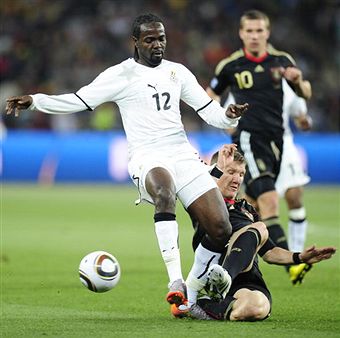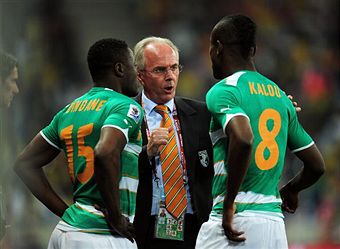On Wednesday night, as England qualified to meet Germany in the round of 16, with the USA topping England’s group and Australia doing Ghana a favour, the great and good of south African football returned to Sandton, the exclusive Johannesburg suburb which they have made their home during this World Cup, and their joy was unconfined.
The reason for the joy was not just on footballing grounds, although these are not insignificant.
The fact that England, the country that gave the game to the world, and Germany, who have won it thrice and always shine in a World Cup, are still involved is important. For all the romance generated by the Davids of this world when they meet Goliaths, it devalues a world competition when the Davids keep slaying the Goliaths. A couple of Davids coming through is fine, and who cannot but cheer Slovakia, World Cup virgins dumping four times winner Italy. But when the world is full of Davids, who then is the underdog?
The real reason for the joy went beyond football and had a lot to do with money. It illustrates that this World Cup is as much about what happens on the field of play as how much filthy lucre it can make for FIFA, the sponsors and, of course, the host nation. And from that perspective England, Germany, USA getting through was vital. Italy and France, the finalists of 2006, not getting through is a huge shock in the football sense, but has little impact on the wider economic scene as far as South Africa is concerned.
This is because England, Germany, USA are South Africa’s biggest markets in terms of trade, tourism, commerce and business. The Mexicans have brought quite a few fans and so have the Dutch. But South Africa has no special ties with Mexico and the historic links between Afrikaners and their ancestral roots in Holland were severed decades ago.
This means that the longer England, Germany, USA remain in the competition the longer will South Africa get publicity in the home markets of these countries.
Of the three USA is the most important. They may be a minnow in football but, as Sepp Blatter told the CONACAF Congress, they are the only superpower. Not all Americans may be devoted to the round ball but sufficient Americans are for South Africa to want to make that interest continue as long as it can.
The joy for Ghana was not about money and investment, but relief that at least one African country will make it to the last 16 in this competition held in Africa for the first time.
 There was some irony here. Ghana’s victory was courtesy of the Australians and you would normally expect South Africans to scowl not smile at news of Aussie sporting triumphs. Most South Africans enjoy nothing more than seeing Australia beaten. South African has a love hate relationship with Australia. They envy their sporting prowess and also how this much smaller country, whose racist past is not much more honourable than that of old white South Africa, never became the pariah of the world.
There was some irony here. Ghana’s victory was courtesy of the Australians and you would normally expect South Africans to scowl not smile at news of Aussie sporting triumphs. Most South Africans enjoy nothing more than seeing Australia beaten. South African has a love hate relationship with Australia. They envy their sporting prowess and also how this much smaller country, whose racist past is not much more honourable than that of old white South Africa, never became the pariah of the world.
Instead it has a very different world image: rugged achievers who also do things with style and wit. As Peter Bruce, editor of Business Day in Johannesburg put it to me, “Australians always seem to be able to make a witty comment when we South Africans can only respond with abuse.”
Nevertheless, on Wednesday the fact that Australia so unexpectedly beat Serbia did not produce the usual South African response of “anybody but Australia”. This time they were more than happy to embrace Australia for the sake of their continent. It meant Africa saving face. But for Australia giving Ghana a helping hand it would have meant that having started this African World Cup with six teams , the largest from any continent barring Europe, there would have been not a single African nation in the knockout stages.
Indeed some of the South African 2010 leaders were so taken by Ghana’s survival that they immediately began to speculate that given Ghana is now in easier half of the draw it could even make the semi-final, something no African country has ever done.
But while I can wholly understand this joy through proxy given South Africa was knocked out, although some it has been over the top, it cannot cover up the colossal African failure in this world Cup. Not in terms of organising or ticket sales or of bringing the competition to the continent. All of that can be put in the well done column even if we must add “could do better” alongside some of these boxes.
The real failure has been in terms of the football. For all the noises made about this being Africa’s moment in history the World Cup has merely reinforced what we already knew. This continent is a land of football mercenaries, not of great football teams. Their individual players may enchant and light up clubs round the world but they can do nothing to help produce winning national teams.
The problem lies not with the players but the administrators and the wretched way they have mismanaged African soccer.
African soccer administrators being incompetent is not exactly a new story but given how much was made of what the competition coming to Africa meant it is still astonishing that with the possible exception of Ghana, where at least the administrators ensured they came to the tournament with a coach who had been with the team for more than a year, some of the antics of the other administrators beggar belief.
In Nigeria’s case this meant appointing the Swede Lars Lagerback in February on a five month contract after Shaibu Amodu was sacked for making only third place in the African Nations Cup.
Ivory Coast sacked coach Vahid Halihodzic after he had lost only twice in 24 games, beaten in a friendly by Japan and then losing in the quarter finals of the African Nations Cup. The speculation was player power had deposed the coach although it seems more like a case of a power struggle within the federation.
 The result was the Ivoirians went shopping for a coach much as you or I might go looking for a replacement car. At their friendly with South Korea in London the Ivoirian officials met that peripatetic Swede, Sven Goran Ericksson (pictured). Are you under contract with a club, asked the Ivoirians? No, said the Swede. Well then, responded the Ivoirians, come and manage our country.
The result was the Ivoirians went shopping for a coach much as you or I might go looking for a replacement car. At their friendly with South Korea in London the Ivoirian officials met that peripatetic Swede, Sven Goran Ericksson (pictured). Are you under contract with a club, asked the Ivoirians? No, said the Swede. Well then, responded the Ivoirians, come and manage our country.
Ericksson, the hired hand, quickly made all the right noises, “I am convinced this will be the year of Africa. They are playing in conditions they know well and it is the first African world Cup.
“They will be really determined to make their mark, there should be a lot of positive energy round the Africans. I see two or three reach the knockout round at the very least. Hopefully Ivory Coast will be one of those.”
Ericksson was so off the mark that going into the final game his side needed to win by nine clear goals to qualify, having secured only one point in their first two matches. The fact is you do not get positive energy by talking about it, you organise, plan and work at it for years. Ericksson has his critics in England but I have always thought he was a good coach but it would have been asking for the impossible to suddenly produce a world beating side in five months.
Yet, in many ways, the most worrying story is here in South Africa itself. The 2010 organisation may be faulted but compared to how South African Soccer Federation is run it is like a well oiled machine.
Danny Jordaan, the charismatic man, who led the long campaign to bring the competition to this country, may be a hero round the world but in his own land he has had to fight to survive. For a time after winning the bid it was not even sure he would be retained as organiser of the World Cup. It required FIFA intervention to make sure he did. Then last year he and the chairman of his organising committee, Irvin Khoza, fought an open battle to control SAFA. Jordaan, in the end, managed to evict the committee controlled by Khoza only to find that the old committee had voted to profit from the money South Africans will get from the competition.
FIFA, which will make money from this first ever foray into Africa, will give ticket money and a bonus to SAFA, a total of around $300 million. The old executive had voted to have 20 per cent of this paid to itself. And despite being ousted it has not given up the fight. The battle will resume after July 11 and could even go to court.
By then South Africa may have proved it can stage a wonderful World Cup. But with the world having departed we will be back to the familiar world of African soccer with the much promised new shinny image of African football once again postponed. What a waste of a golden, once in a generation, opportunity.
And it is no use saying this is Africa. The World Cup shows Africa can stage world class events. Africans football fans, quite the most passionate and aware fans anywhere in the world, also deserve federations that measure up to world standards.
Mihir Bose is one of the world’s most astute observers on politics in sport and, particularly, football. He formerly wrote for The Sunday Times and The Daily Telegraph and until recently was the BBC’s head sports editor. His latest book, “World Cup 2010 South Africa: the Teams, the Players, the Venues”, is available now.
.jpg)